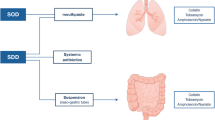Summary
From the point of view of prevention, it is useful to divide infections in intensive care into exogenous infections and primary or secondary endogenous infections. Exogenous infections hardly play a role nowadays. With selective decontamination of the digestive tract (SDD) secondary endogenous infections can be effectively prevented, but for primary endogenous infections SDD comes too late. Primary endogenous infection is the major infectious problem in intensive care. A large number of these infections are postoperative infections and are responsible for a high morbidity and mortality in the intensive care unit. Many of these postoperative infections might be prevented if SDD were started before instead of after the operation when the patient is admitted to the ICU. A tentative list of indications for pre-operative SDD is presented with a flow diagram to determine the optimal infection prevention regimen.
Zusammenfassung
Vom Gesichtspunkt der Infektionsprophylaxe ist es sinnvoll, in der Intensivmedizin zu unterscheiden in exogene Infektionen und primär- oder sekundär endogene Infektionen. Exogene Infektionen spielen kaum eine Rolle heutzutage. Mit selektiver Dekontamination des Verdauungstraktes können sekundär endogene Infektionen effektiv verhütet werden, aber nicht die primär endogenen Infektionen. Die primär endogenen Infektionen sind verantwortlich für eine erhebliche Morbidität und Mortalität in der Intensivstation. Eine große Zahl dieser Infektionen sind post-operative Infektionen, die vermeidbar wären, wenn die selektive Dekontamination vor der Operation durchgeführt würde, statt nachher, wenn der Patient in der Intensivstation aufgenommen wird. Eine Liste von Indikationen für prä-operative selektive Dekontamination wird in Verbindung mit einem Schema für eine optimale Infektionsprophylaxe aufgestellt.
Similar content being viewed by others
References
Stoutenbeek, C. P., van Saene, H. K. F., Miranda, D. R., Zandstra, D. F. The effect of selective decontamination of the digestive tract on colonization and infection in multiple trauma patients. Intensive Care Med. 10 (1984) 185–192.
Unertl, K., Ruckdeschel, G., Selbmann, H. K., Jensen, U., Forst, H., Lenhardt, F. P., Peter, K. Prevention of colonization and respiratory infections in longterm ventilated patients by local antimicrobial prophylaxis. Intensive Care Med. 13 (1987) 106–113.
Kerver, A. J. H., Rommes, J. H., Verhage, E. A. E. Prevention of colonization and subsequent infection in surgical intensive care patients. A prospective randomized study. Critical Care Med. 16 (1988) 1087–1093.
Ledingham, I. Mc.A., Alcock, S. R., Eastaway, A. T., McDonald, J. C., McKay, I. C., Ramsay, G. Triple regimen of selective decontamination of the digestive tract, systemic cefotaxime, and microbiological surveillance for prevention of acquired infection in intensive care. Lancet i (1988) 785–790.
Konrad, F., Schwalbe, B., Heeg, K., Wagner, H., Wiedeck, H., Kilian, J., Ahnefeld, F. W. Kolonisation, Pneumoniefrequenz und Resistenzentwicklung bei langzeitbeatmeten Intensivpatienten unter selektiver Dekontamination des Verdauugstraktes. Anaesthesist 38 (1989) 99–109.
Thülig, B., Hartenauer, U., Diemer, W., Lawin, P., Fegeler, W., Ritzerfeld, W.: Infection control by selective flora suppression in critically ill patients. In:van Saene, H. K. F., Stoutenbeek, C. P., Lawin, P., Ledingham, I. Mc.A. (eds.): Infection control by selective decontamination. Springer Verlag, 1989, pp. 120 (abstract).
Sydow, M., Buchardi, H., Crozier, T. A., Rüchel, R., Busse, C., Seyde, W.: Prospective study of infection and mortality rates in critically ill patients during SDD regimen. In:van Saene, H. K. F., Stoutenbeek, C. P., Lawin, P., McA. ledingham, I. (eds.): Infection control by selective decontamination. Springer Verlag, 1989, pp. 118 (abstract).
van Saene, H. K. F., Stoutenbeek, C. P., Miranda, D. R., Zandstra, D. F. A novel approach to infection control in the intensive care unit. Acta Anaesthesiol. Belg. 34 (1983) 193–208.
Waaij van der, D., Berghuis-de Vries, J. M., Lekkerkerk-van der Wees, J. E. C. Colonization resistance of the digestive tract in conventional and antibiotic-treated mice. J. Hyg. Camb. 69 (1971) 405–411.
Stoutenbeek, C. P., van Saene, H. K. F., Miranda, D. R., Zandstra, D. F., Langrehr, D. The effect of oropharyngeal decontamination using topical non-absorbable antibiotics on the incidence of nosocomial respiratory tract infections in multiple trauma patients. J. Trauma 27 (1987) 357–364.
Mackowiak, Ph. A. The normal microbial flora. N. Engl. J. Med. 307 (1982) 83–93.
Johanson, W. G., Pierce, A. K., Sanford, J. P. Changing bacterial pharyngeal flora of hospitalized patients. Emergence of gram-negative bacilli. N. Engl. J. Med. 281 (1969) 1137–1140.
Valenti, W. M., Trudell, R. G., Bentley, D. W. Factors predisposing to oropharyngeal colonization with gram-negative bacilli in the aged. N. Engl. J. Med. 298 (1978) 1108–1111.
Gatehose, D., Dimock, F., Burdon, D. W., Alexander-Williams, J., Keighley, M. R. B. Prediction of wound sepsis following gastric operations. Br. J. Surg. 65 (1978) 551–554.
Tetteroo, G. W. M., Wagenvoort, J. H. T., Bruining, H. A., Tilanus, H. W. A randomised study on to the efficacy of selective decontamination in patients undergoing oesophageal resection and its epidemiological effects. Intensive Care Med. 14 (1988) 311 (suppl.) (abstract).
Wiesner, R. H., Krom, R. A. F., Hermans, P. Selective bowel decontamination to decrease gram-negative aerobic bacterial and candida colonization and prevent infection after orthotopic liver transplantation. Transplantation 45 (1988) 570–574.
Weidema, W. F.: Whole gut irrigation and antimicrobial prophylaxis in elective colorectal surgery. Thesis 1982, University of Maastricht.
Author information
Authors and Affiliations
Rights and permissions
About this article
Cite this article
Stoutenbeek, C.P., van Saene, H.K.F. How to improve infection prevention by selective decontamination of the digestive tract (SDD). Infection 18 (Suppl 1), S10–S13 (1990). https://doi.org/10.1007/BF01644480
Issue Date:
DOI: https://doi.org/10.1007/BF01644480




